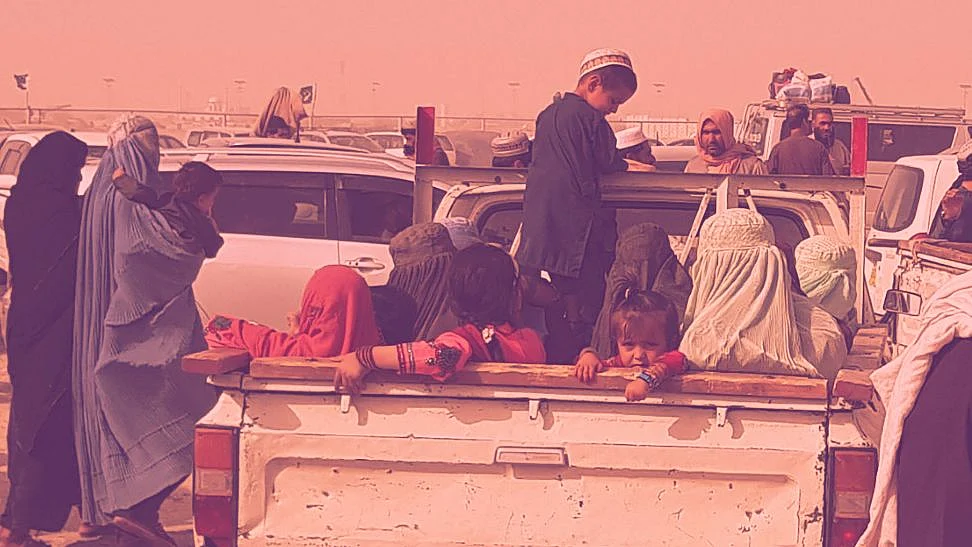
Emergency Visas for Afghans Escaping Taliban: But 'Asylum' is Not 'Citizenship'
In absence of a clear refugee law, Aghans coming to India will be subject to political whims of present government.

advertisement
On 18 August, the Indian government announced a new category of 'emergency electronic visa' for Afghan nationals attempting to escape the country after the Taliban takeover.
The new ‘e-Emergency X-Misc Visa' will be extended to Afghans who "stood by India" during the ongoing crisis and will be valid for six months. Afghan nationals can apply for this visa online and applications will be processed in New Delhi "keeping the country's security in mind".
As the Indian government's decision would lead to the entry of several Afghan nationals into India, there's a need to understand the nature of their legal status.
Refugees, Asylum Seekers, and Migrants: The Difference
While the words 'refugees', 'migrants', and 'asylum seekers' are used interchangeably in common parlance, legally they are different from each other.
Refugee: As per Amnesty International, refugees are those who have fled their own country because they are at the risk of serious human rights violations and persecution there. The risks to their safety and life were so great that they felt they had no choice but to leave their country and seek safety outside because their own government cannot or will not protect them from those dangers.
Asylum Seeker: Asylum seekers are those who have left their country and seek protection from persecution and serious human rights violations in another country but are not legally recognised as refugees and are awaiting a decision on their asylum claim.
Migrant: There is no internationally recognised definition of a 'migrant'. So a migrant can be defined as anyone who leaves their country for another and who is not a refugee or an asylum seeker.
Citizenship Under the Indian Law
Under the Indian law, citizenship finds a place both in the Constitution as well as the Citizenship Act of 1955. Articles 5-9 of Part II of the Constitution define citizenship from the time of "commencement of the Constitution".
Sections 3-7 of the Citizenship Act lay down modes for acquiring Indian citizenship after the commencement of the Constitution through birth, descent, naturalisation, and incorporation of territory.
In 2019, a major and highly controversial change was brought in by the current Bharatiya Janata Party-led union government to the citizenship law. The Citizenship Amendment Act was passed by the parliament to provide Indian citizenship to minority communities fleeing persecution from neighbouring countries. It seeks to offer citizenship to Hindus, Parsis, Buddhists, Sikhs, Jains, and Christians from Bangladesh, Afghanistan, and Pakistan.
An Indian citizen is entitled to all the rights and remedies enshrined under the Constitution and provided by any statute currently in force. The same does not apply to the refugees or asylum seekers. However, this does not mean that a refugee or an asylum-seeker will have no protection in India.
Fate of Afghans Fleeing Taliban
The immigration law in India is covered under the Passport (Entry Into India) Act, 1920, the Foreigners Act, 1946, and the Registration of Foreigners Rules, 1946.
While there is no refugee law, there are standing operating procedures (SOPs) issued by the MHA on 29 December 2011, as "internal guidelines" for central and state agencies on “how to deal with refugees.”
The SOPs allow foreigners “claiming to be refugees” to make a representation before Foreigners Regional Registration Office (FRRO) seeking a Long Term Visa. The FRRO is tasked to collect details from the 'foreigner' about the reasons and circumstances in which they left their country of origin, and any document issued by either a national or international agency such as the United Nations High Commissioner for Refugees.
If the FRRO feels that there is a “general perceived threat” in the foreigner’s home country, which may subject them to persecution on account of race, religion, sex, nationality, ethnic identity, membership of a particular social group, or political opinion, the case will be referred to the MHA.
The MHA considers the FRRO report and consults the Ministry of External Affairs (MEA), on whether to grant a Long Time Visa of up to one year to the concerned foreigner. This Long Term Visa can be extended annually for up to five years by making an application to the FRRO.
Under the SOPs, Long Term Visas offer a degree of stability and security to the refugees in India, as holders are eligible for employment in the private sector and can also study in any academic institution. Further, they cannot be deported without special MHA clearance.
Therefore, the fate of Afghan nationals coming to India under the new emergency visa hangs in delicate balance. What's certain is that in the absence of a refugee law, their future in India is open to the political whims and fancies of the present government. History has shown that such a situation does not usually yield positive outcomes.
(At The Quint, we question everything. Play an active role in shaping our journalism by becoming a member today.)
- Access to all paywalled content on site
- Ad-free experience across The Quint
- Early previews of our Special Projects
Published: undefined